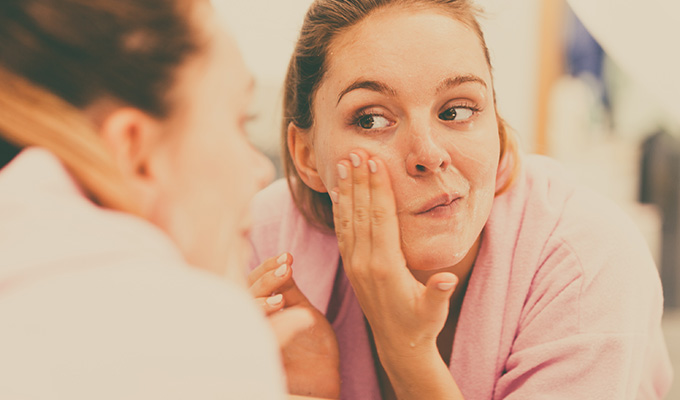The key to great skin is balance. In order to find a perfect balance, we have to be conscious of the pH level of our skin. This is because your skin has an ideal pH level in order to keep it functioning at its best. When it’s too high or too low (which can happen for any number of reasons) it can completely throw off the look and feel of your skin. When the pH of your skin is functioning as it should, it works as a protective barrier and is able to look and feel good without any irritation or skin concerns.
To help you get a better understanding of all of this, we’re sharing what your skin’s pH should be, what impacts it, and how you can keep it all balanced.
pH & Your Skin
If you aren’t familiar with the pH scale, it’s essentially a numeric scale that measures how acidic or alkaline something is. This scale ranges from 0-14, with lower numbers being the most acidic and the highest being the most alkaline. A 7 on the pH scale means something is considered to be neutral. Your skin’s ideal pH level is in the range of 4.5 to 5.5, which means the skin is ever so slightly acidic.
When the skin is at its ideal pH, it’s able to maintain its protective barrier. This acidic outer barrier of the skin is known as the “acid mantle”or hydrolipidic film. The acid mantle needs to be able to protect us from the pollution and bacteria that we encounter on a daily basis. Not only that, but it also functions to break down excess sebum as well as fight against bad bacteria. It has a lot of jobs so when the acid mantle is out of balance, skin problems can occur.
What happens when your skin’s pH level is off? It depends on where you’re at within the pH spectrum. If your skin has a pH that’s too alkaline (high on the scale), it can lead to redness, dryness, flakiness, or itchiness. When the skin is feeling dry and dehydrated, you might see eczema flaring up or notice signs of aging (like wrinkles and fine lines) are more prevalent.
However, if your pH level is too acidic (low on the scale), that can trigger an entirely different set of problems such as redness and inflammation within the skin. As you may already know, inflammation is just one of the things that can trigger acne to flare up.
Keeping Your Skin’s pH Balanced
It’s important to understand exactly what can change the pH of your skin. This includes everything from what you’re putting onto your skin and what you’re putting into your body. Your skincare routine, such as the products you use and even how often you wash your face, can impact its pH level.
To balance your skin’s pH, make sure you’re treating your skin like the delicate organ it is. Sometimes people go overboard with their skincare routine. For example exfoliating too frequently or over-cleansing. This can unintentionally harm the skin.
You’ll also want to start using products that are designed to balance the skin’s pH and return it to its ideal level of 4.5 to 5.5. For instance, a cleanser such as Yon-Ka’s Lait Nettoyant is made for all skin types and easily removes makeup while purifying the skin without stripping. It does all of this while working to restore the skin to its naturally balanced pH.
If you notice a sudden change in your skin at any time, take a look at anything that may have changed in your life. Did you switch to a harsh new soap or detergent? Have the seasons recently changed? Have you been eating differently? All of these elements can greatly impact your skin’s pH level. Once you’re paying attention, you’ll start to pick up on what negatively interacts with your skin and what helps balance it.
